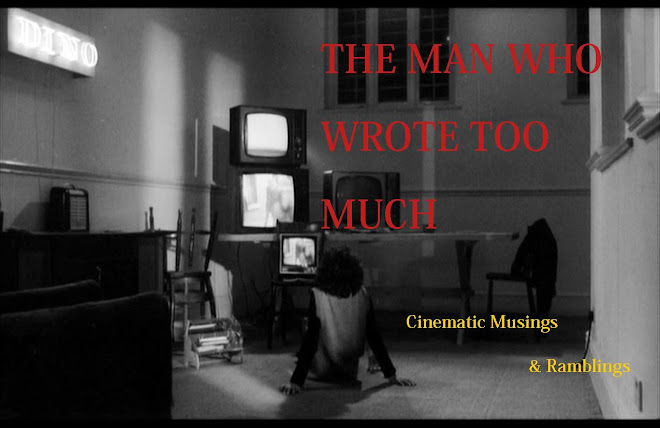The film, whose title when mentioned in casual conversation sounds considerably less wholesome until mention of its directors name, actually fits safely within the mode in which we find a good percentage of Hitch’s output, that of ‘the wrong man’ thriller. Following the murder of a renowned actress, a friend of hers Robert Tisdall (Derrick De Marney) finds her body and is himself accused of the murder, with a flimsy case of motive placed upon him due to money being left to him in her will.
+1.JPG)
He manages to escape custody and proceed to go on the lam, coercing the local police chief’s daughter Erica Burgoyne (Nova Pilbeam) into aiding him in escaping the manhunt, and to help in his quest to find a tramp who has in his possession (wait for it... *cough*), a raincoat of Tisdall’s which was stolen by the murderer, had its belt used in the murder and was then given to the tramp and which will thus prove Tisdall’s innocence and lead to the capture of the real murderer... right... Not that I have any problem with outlandish plots from Hitch, a man whose oeuvre often features credibility stretching macguffins in order to progress matters, but a used raincoat?
The film actually opens in a startling fashion; we immediately bear witness to a raging domestic argument while a thunder storm thrashes away in the background, in an unusual turn, our murderer is revealed right away in an oppressively atmospheric scene transported from the bleak noir this film never manages to become. The following ten minutes manage to retain some of this downbeat vibe, as Tisdall finds the victim’s body washed up on the shore, and soon finds himself accused and fingered for the blame by a seemingly corrupt police force wishing to close the case quickly despite a paucity of strong evidence.
Once Tisdall makes his rather farcical escape from custody though, the film becomes more a comedy road caper than intense thriller. Those hoping for a Bonnie & Clyde hit the Home Counties scenario will find themselves rather disappointed. A lot of the blame for this can be attributed to De Marney’s performance, his Tisdall comes across as so smug and self assured that his innocence will be proven that the audience is never really given to worrying for his fate. Pilbeam’s ‘Jolly what-ho’ attitude towards the situation is also rather more Enid Blyton than Hitchcock, further reducing the suspense.
+3.JPG)
Pilbeam’s Erica has the makings of an interesting character, she appears to have taken over the maternal role for her large family (the actual mother an unexplained absentee), and as the eldest child suddenly betraying her chief of police father to go on the run with Tisdall, this makes for an intriguing act of rebellion against her re-positioning within the family hierarchy that is never fleshed out.
Once we can gradually accept this as one of Hitch’s lighter pictures though, there are small rewards to be garnered. Edward Rigby’s turn as the sought after tramp ‘Old Will’, is a humorous one, and the closing set piece features one of those classic ‘Hitchcockian’ virtuoso camera moves that we see at least once a film. In this case an audacious pan and zoom across a ballroom as Hitch zooms right into an extreme close-up on the face of the murderer revealing his presence within the room (in a scene that also has an unpleasant reminder of a world before 'The Black and White Minstrels' were considered tasteless...).
+4.JPG)
Fluffy, throwaway, and with slight central performances, Young and Innocent may be second grade Hitchcock, but it still manages to entertain just enough in its brief 80 minutes to make it worthy of inclusion in any personal ‘British period’ Hitchcock retrospective you may be planning.
By the way if you embarrassed to ask for a copy of the picture at your local DVD retailer due to its misleading title, why don’t you try its alternative American title of The Girl Was Young? Hmmm actually.....
